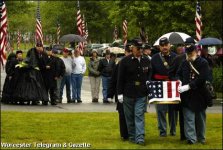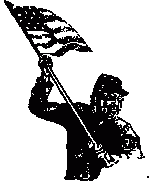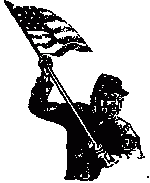Gypsy Heart
Gold Member
Mass. Union soldiers laid to rest in Bourne
Remains of 6 interred in unmarked Virginia graves for 145 years
http://www.telegram.com/apps/pbcs.dll/article?AID=/20060611/NEWS/606110667/1052/RSS01&source=rss
BOURNE— Union soldiers thought they would overrun the Confederates and return home victorious in short order. The remains of six, however, did not make it home until yesterday.
The remains were buried at the Massachusetts National Cemetery, 145 years after the men died on a battlefield in Virginia during the early days of the Civil War.
“For them, it has been a long journey home,” cemetery director Paul McFarland said at a ceremony that drew 200 people despite steady rain. “The journey started here in Massachusetts. To borrow a phrase often used between our Vietnam veterans, ‘Welcome home.’ ”
Killed days before the first battle of Manassas — a Confederate victory in July 1861 that surprised President Lincoln — their graves were unmarked and undiscovered until the early 1990s, when relic hunters came across bones on a site slated for the construction of a McDonald’s restaurant in Centreville, Va.
Using war records and other clues, including uniform types, they were later identified as members of the 1st Massachusetts Infantry Regiment, although they were buried as “unknown” because DNA testing hasn’t been done.
A fife and drum band led a hearse carrying the six wooden caskets — each 3 feet long and covered by an American flag — in a procession through the cemetery, where 40,000 other veterans and their spouses, including Iraq war veterans, are interred.
Jerry Casey, 51, said he drove 45 minutes from his Dartmouth home because he didn’t want the men to be buried alone. The truck driver said he was saddened last year to see a veteran — the hearse had American flags on it — drive to the cemetery alone.
“That poor guy, coming down here by himself, no family,” he said. “I saw this (Union soldiers) on the news and said, ‘I’ll go down there.’ I’m sure these guys don’t have any family.”
Indeed, no descendants have been identified yet, which means there’s no DNA matches to be had, resulting in the “unknown” burials.
McFarland said the remains were tentatively identified as William A. Smart of Cambridge, Albert F. Wentworth of Chelsea, Thomas Roome of Boston, George Bacon of Chelsea, Gordon Forrest of Malden, and James Silvey of Boston.
“They have names, but they couldn’t match who was who,” he said before the ceremony.
The anonymous burials reportedly didn’t sit well with the Virginians who discovered and researched the remains. But Michael Johnson, a Fairfax County archaeologist who led the excavation, said the identification process can continue if family members are found and want to pay for expensive DNA testing.
“It still can be done through a court order, rather than leave them in a box on a shelf,” said Johnson, who attended the ceremony.
Kevin Ambrose, a member of the Northern Virginia Relic Hunters Association, discovered the unmarked graves. The remains later were turned over to the Smithsonian Institution, where they stayed for about a decade.
Another relic hunter, Dalton Rector, a descendant of a Confederate soldier, spent years researching the identities, and eventually teamed with Bellingham resident Frank Haley, a member of the Sons of Union Veterans of the Civil War, to get the remains moved to Massachusetts.
One other Civil War veteran is interred at the Massachusetts National Cemetery, where World War II veterans dominate. The remains of the unidentified soldier were discovered about 10 years ago in South Carolina.
Before yesterday, the most recent burial was Marine Lance Cpl. Patrick J. Gallagher, 27, who died in April in Iraq. Gallagher grew up in nearby Fairhaven.
Remains of 6 interred in unmarked Virginia graves for 145 years
http://www.telegram.com/apps/pbcs.dll/article?AID=/20060611/NEWS/606110667/1052/RSS01&source=rss
BOURNE— Union soldiers thought they would overrun the Confederates and return home victorious in short order. The remains of six, however, did not make it home until yesterday.
The remains were buried at the Massachusetts National Cemetery, 145 years after the men died on a battlefield in Virginia during the early days of the Civil War.
“For them, it has been a long journey home,” cemetery director Paul McFarland said at a ceremony that drew 200 people despite steady rain. “The journey started here in Massachusetts. To borrow a phrase often used between our Vietnam veterans, ‘Welcome home.’ ”
Killed days before the first battle of Manassas — a Confederate victory in July 1861 that surprised President Lincoln — their graves were unmarked and undiscovered until the early 1990s, when relic hunters came across bones on a site slated for the construction of a McDonald’s restaurant in Centreville, Va.
Using war records and other clues, including uniform types, they were later identified as members of the 1st Massachusetts Infantry Regiment, although they were buried as “unknown” because DNA testing hasn’t been done.
A fife and drum band led a hearse carrying the six wooden caskets — each 3 feet long and covered by an American flag — in a procession through the cemetery, where 40,000 other veterans and their spouses, including Iraq war veterans, are interred.
Jerry Casey, 51, said he drove 45 minutes from his Dartmouth home because he didn’t want the men to be buried alone. The truck driver said he was saddened last year to see a veteran — the hearse had American flags on it — drive to the cemetery alone.
“That poor guy, coming down here by himself, no family,” he said. “I saw this (Union soldiers) on the news and said, ‘I’ll go down there.’ I’m sure these guys don’t have any family.”
Indeed, no descendants have been identified yet, which means there’s no DNA matches to be had, resulting in the “unknown” burials.
McFarland said the remains were tentatively identified as William A. Smart of Cambridge, Albert F. Wentworth of Chelsea, Thomas Roome of Boston, George Bacon of Chelsea, Gordon Forrest of Malden, and James Silvey of Boston.
“They have names, but they couldn’t match who was who,” he said before the ceremony.
The anonymous burials reportedly didn’t sit well with the Virginians who discovered and researched the remains. But Michael Johnson, a Fairfax County archaeologist who led the excavation, said the identification process can continue if family members are found and want to pay for expensive DNA testing.
“It still can be done through a court order, rather than leave them in a box on a shelf,” said Johnson, who attended the ceremony.
Kevin Ambrose, a member of the Northern Virginia Relic Hunters Association, discovered the unmarked graves. The remains later were turned over to the Smithsonian Institution, where they stayed for about a decade.
Another relic hunter, Dalton Rector, a descendant of a Confederate soldier, spent years researching the identities, and eventually teamed with Bellingham resident Frank Haley, a member of the Sons of Union Veterans of the Civil War, to get the remains moved to Massachusetts.
One other Civil War veteran is interred at the Massachusetts National Cemetery, where World War II veterans dominate. The remains of the unidentified soldier were discovered about 10 years ago in South Carolina.
Before yesterday, the most recent burial was Marine Lance Cpl. Patrick J. Gallagher, 27, who died in April in Iraq. Gallagher grew up in nearby Fairhaven.
Attachments
Upvote
0









